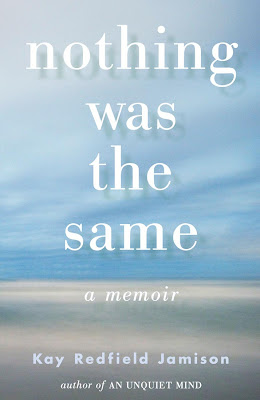By Bill Williams
Kay Redfield Jamison has often written and spoken eloquently about her lifelong struggle with manic depression, otherwise known as bipolar illness.
In her new book, Nothing Was the Same: A Memoir, she writes with the same honesty and passion about coping with the death of her husband, Richard Wyatt, from cancer. Both were well-known psychiatrists at Johns Hopkins University in Baltimore. Despite severe dyslexia, Wyatt became a leader in the study of schizophrenia.
The book can be divided into three parts: a poignant story of unexpected love, a desperate search for ways to prolong Wyatt’s life, and a tormented period of mourning after he died.
Wyatt was 45 and Jamison 38 when they met. She was drawn to his reserve and intelligence, and saw him as “catnip to women.” He understood her mental illness and encouraged her to write about it — a scary thought because she had hid her fears and grown up “sealed tightly as a vault.”
When her book An Unquiet Mind was published in 1995, Jamison received thousands of letters, most of them supportive. But she also received hateful missives, which gave her “more than a taste of the intolerance and hatred religious extremity harbors toward those with mental illness.”
The couple’s fairy-tale marriage took a sharp turn when doctors found tumors in Wyatt’s liver and lungs in 1999. The remaining few years of his life became a roller coaster of emotional ups and downs.
Because of Wyatt’s reputation and connections, he was able to take advantage of every experimental treatment that offered any hope. One wonders if he was getting medical care superior to what most people could access or afford, merely because of his position. According to the author, Wyatt had no spiritual faith. He trusted medicine and science to find answers to cancer.
During Wyatt’s gradual decline, the couple bravely tried to enjoy life as much as possible. Jamison recalls “long evenings of friendship and laughter” with friends. He became more physically affectionate and held her close “in a way I had not known him to do before.” Near the end, Wyatt’s lungs collapsed. He underwent surgery, but within days, other major organs failed. Jamison finally gave permission to remove life support.
Initially, the loss almost overwhelmed her. When she was least expecting it, “a memory would bring me to my knees.” She visited his grave often, spoke aloud to him and often blurted out, “I want my husband back.”
“I felt at sea, assailed, numb,” she writes. “I did not know what I thought or felt – everything was jumbled, in flux, and contrary.” Gradually, Jamison found strength in the support of family and friends. She also drew on poetry, particularly Tennyson’s In Memoriam.
She eventually found her way back to life through writing. During her husband’s illness she was writing a book about exuberance, “an odd topic, given what we were going through.”
The author distinguishes between depression, which she knew well, and grief, which was a new experience. The two may be distant cousins, but grief bears little resemblance to the “malignant, indiscriminately destructive” nature of depression, she writes.
Reading Nothing Was the Same, one senses the author’s devotion to her husband and her grief over his death, and yet something is missing. Few of the scenes are etched deeply enough to create lasting impressions.
Moreover, the book fails to rise to the level of universal meaning or significance. In the end, this is a story of a middle-aged couple deeply in love, and the author’s grief when her husband died. But one searches in vain for wisdom or deeper meaning that might help others who have lost a spouse.
It may be unfair to expect that every book about love and loss will resonate on a universal level. Perhaps it is enough to think of this account as a well-written personal story by a talented author who has suffered – and survived — serious mental illness and, more recently, the loss of her beloved husband.
Bill Williams is a free-lance writer in West Hartford, Conn., and a former editorial writer for The Hartford Courant. He is a member of the National Book Critics Circle.
Nothing Was the Same: A Memoir, by Kay Redfield Jamison, 208 pp., Knopf, $25.
